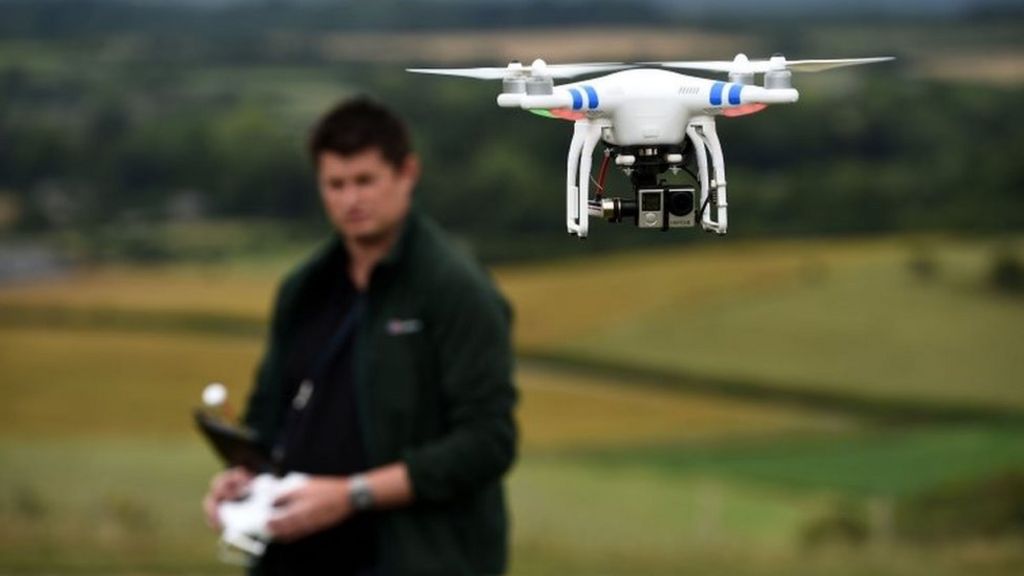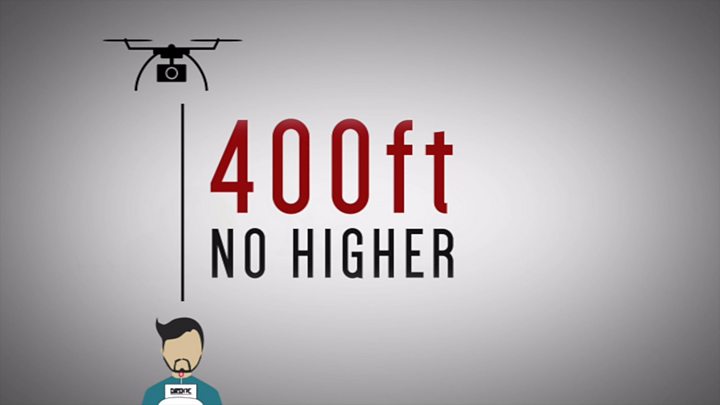UK Drone Users To Sit Safety Tests Under New Law

 Image copyright
PA
Image copyright
PA
Drone users in the UK will be required to do safety awareness tests as part of planned new legislation on their usage.
Police will also be given new powers to crack down on illegal use of the unmanned aerial vehicles.
The government hopes to harness new drone technology which could see them used on oil rigs, in construction, for organ transport and parcel deliveries.
The bill has been welcomed by the pilots' union, which has warned of near misses involving drones and aircraft.
Balpa said there had been 81 incidents so far this year - up from 71 in 2016 and 29 in 2015.
The union's general secretary, Brian Strutton, said: "These proposals are a step towards the safe integration of drones, but until the new rules are in place the threat of a serious collision remains."
In July a drone flew directly over the wing of a large passenger jet as it came into land at London's Gatwick Airport, which a report said had put 130 lives at risk.
The proposed bill - to be published in spring 2018 - would ensure that owners of drones weighing more than 250g would need to register and sit a test.
Owners would be banned from flying them near airports or at heights above 400ft.
Police could also get new powers to ground and seize drones if they suspect they had been used in criminal activity.

Media playback is unsupported on your device
Christian Struwe, head of European public policy at drone maker DJI, warned that some of the proposals may be "difficult to police" - for example the height restriction.
But he told BBC Breakfast: "The good thing is that as an industry we are already working on it. We can limit how high they can fly."
Mr Struwe pointed out that currently there is no "hard limit" on how close drones can fly to airports. "The current wording is that you should stay well clear," he said.
He welcomed the proposals to limit the "bad use" of drones, adding that it was important people are aware there is regulation they need to follow.
Aside from the Civil Aviation Authority's Drone Code, he said drone users should respect their neighbours' right to privacy and steer clear of sensitive areas, such as government buildings.
The transport minster, Lady Sugg, said the government wanted to strike the right balance between harnessing drone potential and ensuring they are not misused.
"We're bringing forward this legislation in order to ensure that drones can be used safely, whilst also addressing some of the safety and privacy concerns that people have," she said.
The government is also working with drone manufacturers on technology which produces virtual barriers, to stop the machines operating in restricted areas.
From Chip War To Cloud War: The Next Frontier In Global Tech Competition
The global chip war, characterized by intense competition among nations and corporations for supremacy in semiconductor ... Read more
The High Stakes Of Tech Regulation: Security Risks And Market Dynamics
The influence of tech giants in the global economy continues to grow, raising crucial questions about how to balance sec... Read more
The Tyranny Of Instagram Interiors: Why It's Time To Break Free From Algorithm-Driven Aesthetics
Instagram has become a dominant force in shaping interior design trends, offering a seemingly endless stream of inspirat... Read more
The Data Crunch In AI: Strategies For Sustainability
Exploring solutions to the imminent exhaustion of internet data for AI training.As the artificial intelligence (AI) indu... Read more
Google Abandons Four-Year Effort To Remove Cookies From Chrome Browser
After four years of dedicated effort, Google has decided to abandon its plan to remove third-party cookies from its Chro... Read more
LinkedIn Embraces AI And Gamification To Drive User Engagement And Revenue
In an effort to tackle slowing revenue growth and enhance user engagement, LinkedIn is turning to artificial intelligenc... Read more

